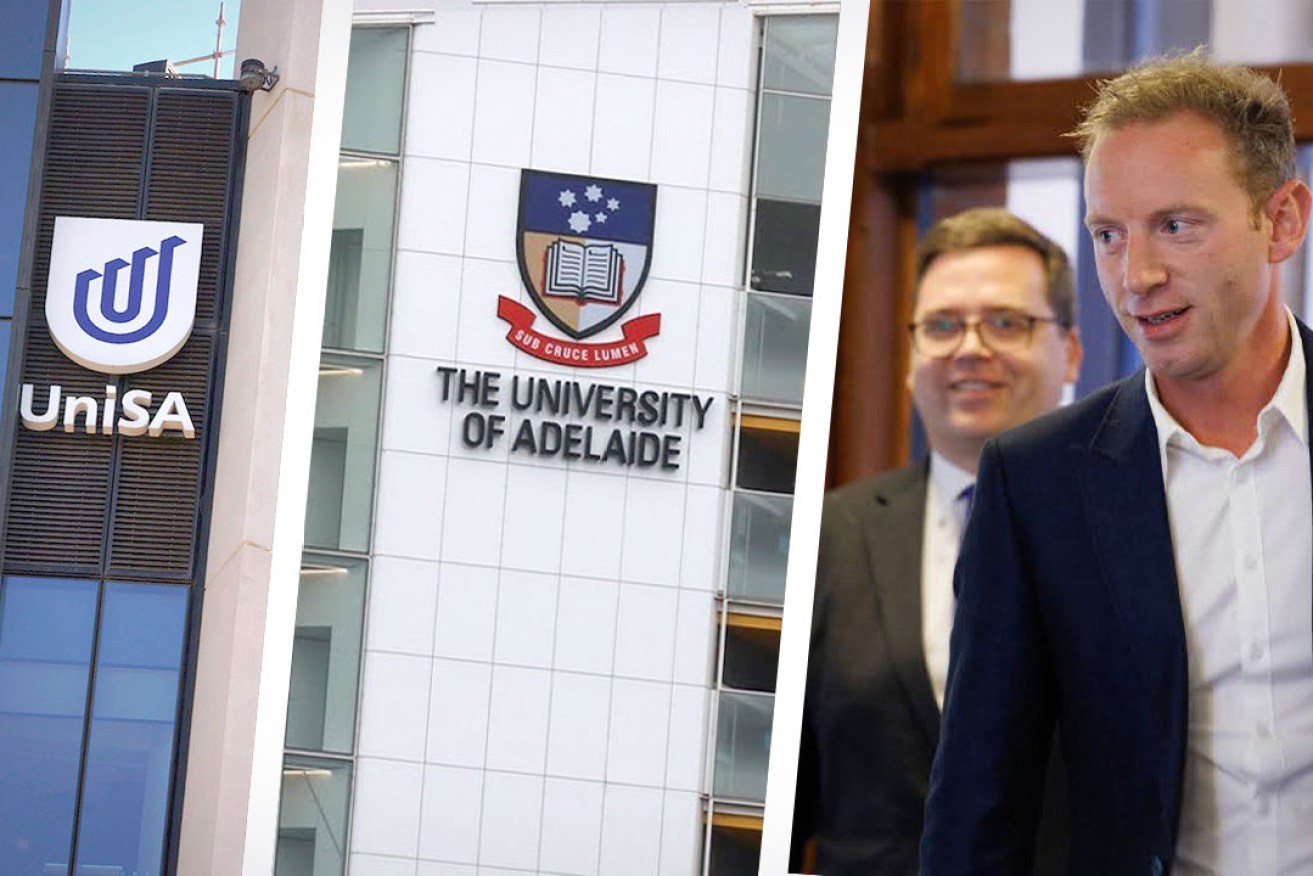‘Too big to fail’: Libs back uni merger
The state Opposition will support legislation to merge the University of Adelaide and UniSA, saying it rules out “political expediency” and wants to ensure confidence in the new institution.


Opposition leader David Speirs and deputy leader John Gardner have made a series of election commitments about the university merger after deciding to support it. Photos: Tony Lewis/InDaily
Opposition education spokesperson John Gardner told parliament a short time ago that he had received additional assurances from the vice-chancellors of the two universities about risk mitigation and regional investment, and the Liberal Party would now support the Bill.
Government legislation to establish the new Adelaide University is scheduled for debate today in the Upper House, where it is expected to pass this week.
The Opposition’s announcement of support comes nearly two weeks after the Malinauskas Government secured the crossbench votes of One Nation’s Sarah Game and SA-Best’s Connie Bonaros – all but sealing the legislation’s passage through parliament.
Gardner, who was on the committee inquiry into the merger and co-authored a minority report flagging concerns, said the Opposition was supporting this Bill in the context of knowing that it would pass in the Upper House regardless of the party’s position.
“This proposal is too big to fail,” Gardner told parliament after midday.
“This will pass the Legislative Council this week irrespective of what the Liberal Party does.
“And in that circumstance, in the beginning of 2026, we will have a new university in South Australia. It will be responsible for educating two-thirds of our degree-qualified graduates… this will also be responsible for seven to eight thousand staff and for 60 to 70,000 students.
“It is now one of those propositions that now it is going to happen, it is what they call too ‘too big to fail’.
“There was pathway available to the Opposition to oppose this bill for political expediency because there will be bumps in the road in the next couple of years, make no mistake.”
Gardner later said the Opposition support for the legislation does not “absolve the government’s responsibility for any problems that we might see along the way”.
But he said everyone in parliament needed to “lean in” to the merger proposal to ensure confidence in the new institution.
“One of the biggest risks to the proposition is if there are researchers who are operating at a high level of Adelaide University who leave the institution not being happy with the way the culture works… not being happy with the way the transition is working out,” he said.
“That will have an impact on rankings.”
Gardner also pondered what the Labor Party would do if they were in opposition.
“Some have said well they would just oppose it, try and kill the bill in the Legislative Council and if they couldn’t, then they would spend the next two years seeking to undermine the proposal and taking political glee every time something went wrong,” he said.
“The Liberal Party is not about that because our interest is in the people of South Australia.
“We will support this bill because it is going to pass and it is too big to fail and it requires everyone to lean in to that effort.”
The Opposition also pledged today to provide Flinders University with more financial support and establish at least one “Uni Hub” campus in the regions if elected to government in 2026.
The extra support for Flinders University would come via a research fund equivalent per capita to the $200 million perpetual fund being established for Adelaide University.
The fund, which could be worth between $60 to $100 million, would focus on Flinders University’s areas of expertise including defence, agtech and health sciences.
Flinders University raised concerns during the inquiry that an Adelaide University with access to a perpetual research fund “could simply hire researchers out of Flinders and bring all their research income with them”.
“That would clearly benefit the new institution, it would be to the detriment of Flinders and it wouldn’t make a jot of difference to the amount of research being done in the state,” Flinders University vice-chancellor Colin Stirling told MPs on August 9.
The Malinauskas Government is not establishing an equivalent research fund for Flinders University but is, as part of its deal reached with Bonaros and Game, providing the university with a $40 million perpetual fund to support enrolment of low socioeconomic students.
Only the Greens have indicated they will vote against the merger legislation. Greens MLC Robert Simms said he would move 23 amendments to the government’s Bill to strengthen protections for university staff and require greater transparency on the new university’s council, including mandatory publication of council agenda and minutes.
SA-Best MLC Frank Pangallo, who did not announce his support for the Bill when his party colleague Bonaros did, told InDaily today he would support the merger with reservations.
“I will be supporting it, but with some reservations about the enormous financial and logistical risks the merger faces,” Pangallo said.
“I expect it will cost far more than the Premier and the universities are anticipating. It is a pity that we never got to see the business case.”




